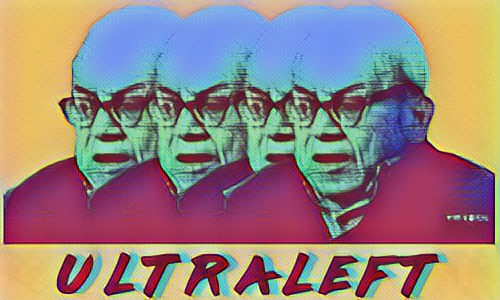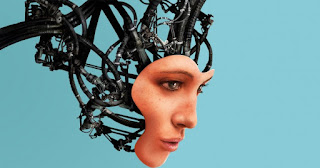New Myth
It is time for a new myth. Not a myth based in mysticism. But myth as story or fable. For the purpose of telling a story myth is neutral. There can be good ideas or bad ideas taught by myth. What is important here is the evolution of ideas and their correspondence with fundamental truth. For this purpose, we should use myth to teach lessons and express our values. What is the new myth to be told? It is called New Humanism.
New Humanism reflects a new radical center. As philosophy is carried away by trajectories and regressions which result in strange mysticisms and anti-humanism, we must look for a revival of humanism in a radical sense. What is meant here by radical humanism is a fully empowered agency, creativity, and freedom of the individual. Yet not an unguided will of the individual committed to transgression for the sake of freedom of choice alone. It is to be based in an ethical egoism - an acknowledgement that the will of the individual is in social solidarity with other fellow humans.
These old myths of capitalism and socialism are failed in their practice. The myths of Prometheus and Gaia, propose a new orientation towards technology and ecology. But we have seen the tendency for these to result in extremes as well. Such extremes lend themselves to eco-nihilism and technological fever dreams.
In response to this four sided failure of political philosophy, we must chart a new course. We could turn here to the philosophy of M.N. Roy. This philosophy emphasizes a revival, renaissance, and renewal of humanism. A Humanism rooted in its many iterations and varieties from its Greek conception, to the Indian contribution, as well as the Spinozan or renaissance model. According to Roy, one of the tasks of the Renaissance movement should be to rescue the positive outcome and abiding contributions of ancient thought – contributions, which just like the contributions of Greek sages, are lying in ruins under the decayed structure of the Brahmanical Society – the tradition of which is erroneously celebrated as the Indian civilization.
Yet this New Humanism is not merely a reshaping of these old forms of humanism. It is a new conception of the seemingly endless possibilities for human flourishing. What this may look like is the cosmopolitan union of liberated persons.
New Humanism
Apart from Roy’s effort to trace the quest for freedom and search for truth to the biological struggle for existence. The basic idea of the first three theses of Roy is individualism. According to Roy, the central idea of the Twenty-Two Theses is that political philosophy must start from the basic idea that the individual is prior to society, and freedom can be enjoyed only by individuals.
Quest for freedom and search for truth, according to Roy, constitute the basic urge of human progress. The purpose of all-rational human endeavor, individual as well as collective, is attainment of freedom in ever-increasing measure. The amount of freedom available to the individuals is the measure of social progress. Roy refers back the quest for freedom to human being’s struggle for existence, and he regards search for truth as a corollary to this quest. Reason, according to Roy, is a biological property, and it is not opposed to human will. Morality, which originates from the rational desire for harmonious and mutually beneficial social relations, is rooted in the innate rationality of man.
Beyond Communism
Roy’s criticism of communism, contained in theses seven to eleven is based mainly on the experience of the former Soviet Union, particularly the “discrepancy between the ideal and the reality of the socialist order.” According to Roy, freedom does not necessarily follow from the capture of political power in the name of the oppressed and the exploited classes and abolition of private property in the means of production. For creating a new world of freedom, revolution must go beyond an economic reorganization of society. A political system and an economic experiment which subordinate the man of flesh and blood to an imaginary collective ego, be it the nation or class, cannot possibly be, in Roy’s view, the suitable means for the attainment of the goal of freedom.
The Marxian doctrine of state, according to which the state is an instrument of exploitation of one class by another, is clearly rejected by Roy. According to Roy, the state is “the political organization of society” and “its withering away under communism is a utopia which has been exploded by experience”.
Similarly, Roy rejects the communist doctrine of the dictatorship of the proletariat. “Dictatorship of any form, however plausible may be the pretext for it, is,” asserts Roy, “excluded by the Radical-Humanist perspective of social revolution.”
Radical Democracy
Thus, Roy’s ideal of radical democracy, as outlined in theses fourteen to twenty-two consists of a highly decentralized democracy based on a network of people’s committee’s through which citizens wield a standing democratic control over the state.
Roy has not ignored the economic aspect of his ideal of radical democracy. He argued that progressive satisfaction of the material necessities is the pre-condition for the individual members of society unfolding their intellectual and other finer human potentialities. According to him, an economic reorganization, which will guarantee a progressively rising standard of living, is the foundation of the Radical Democratic State. “Economic liberation of the masses”, says Roy, “is an essential condition for their advancing towards the goal of freedom.”
The ideal of radical democracy will be attained, according to Roy, through the collective efforts of mentally free men united and determined for creating a world of freedom. They will function as the guides, friends and philosophers of the people rather than as their would-be rulers. Consistent with the goal of freedom, their political practice will be rational and, therefore, ethical.
Roy categorically asserts that a social renaissance can come only through determined and widespread endeavor to educate the people as regards the principles of freedom and rational co-operative living. Social revolution, according to Roy, requires a rapidly increasing number of men of the new renaissance, and a rapidly expanding system of people’s committees and an organic combination of both. The program of revolution will similarly be based on the principles of freedom, reason and social harmony.
Roy believed that “a new Renaissance based on rationalism and cosmopolitan humanism” was essential for democracy to be realized.
Demos Mythos
What is needed is a new myth for democracy. Myths to be written by individuals as they each explore the opportunities for human flourishing. Not a myth about some powerful deity or wise goddess but rather a myth that tells the story about the human spirit. The search for truth is at the center of such an approach.
The demos mythos empowers the people.




Comments
Post a Comment